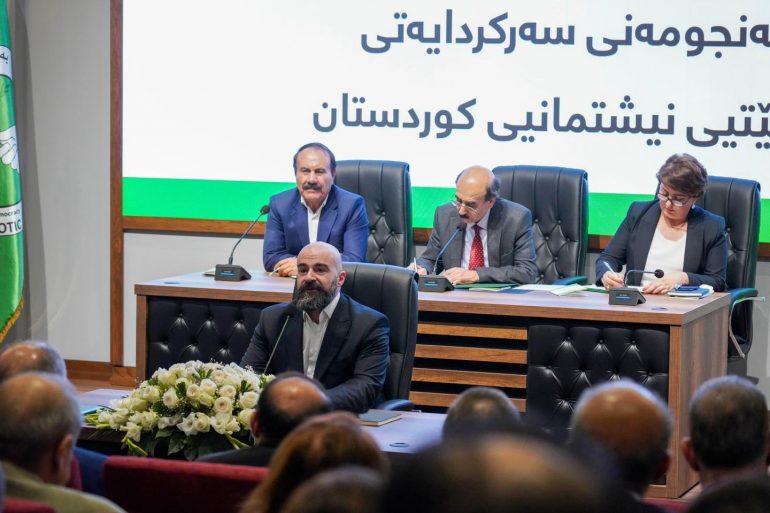For 48 years, the Patriotic Union of Kurdistan (PUK) has been a mosaic of political thought. A big tent hosting factions and ideologies across the political spectrum. Despite only four congresses in its history, the PUK has consistently embraced intra-party pluralism. Now, in a hastily convened congress, current leader Bafel Talabani aims to consolidate power firmly under his control.
The PUK was birthed from a coalition of disparate political groups, including the Marxist-Leninist Komala and the Kurdistan Socialist Movement. This has sown ongoing ideological disputes and personal rifts, making congresses arenas of factional warfare. Historically, the PUK’s influential leaders, each with their own political leanings, have been wary of congresses, fearing they could splinter the party further. Bafel Talabani, however, is now set on charting a different course.
On August 20, under the leadership of Bafel Talabani, the PUK’s politburo marked 27 Sept. for its fifth congress. This tight schedule provided just 38 days for preparations and delegate selection—a process that typically spanned at least six months. Overriding the party’s bylaws, Talabani selected most of the congress delegates himself, with only a few chosen through local party branches, a marked departure from convention.
The upcoming congress has a clear goal: to end Lahur Sheikh Jangi Talabany’s influence within the PUK. Talabany, who clinched a victory in the fourth congress, once sat at the party’s helm alongside Bafel Talabani. But it’s been over two years since Talabani and his inner circle orchestrated Lahur’s controversial removal from party leadership. Despite this, Lahur Talabany retains a strong base of support at the grassroots level, and some of the PUK’s elite remain in his corner. Those vocal in their support for the deposed co-leader, however, are excluded from the next congress. Still wielding his co-president title in the media, Jangi hints at political ambitions under the PUK’s flag. But this congress could definitively end his bid to reclaim power within the party.
Prominent figures are set to be absent from the forthcoming congress, including ex-Iraqi President Barham Salih and Mala Bakhtiar, of the PUK’s supreme council. Bakhtiar made waves with an extended video statement, announcing his decision to boycott the congress due to serious reservations about its orchestration and profound disagreements with Bafel Talabani. He also voiced concern over Talabani’s ambition to swell the council’s ranks to 21-31 members, denouncing the expected congress votes as mere “appointments.” Bakhtiar, a leading thinker within the PUK, condemned the wholesale exclusion and sidelining of party cadres who dare criticize the leadership.
The congress also seeks to transform the PUK into a familial stronghold, a stark departure from its foundational values. Initially, the PUK was formed as an antidote to the Kurdistan Democratic Party’s (KDP) clan-driven politics. Jalal Talabani, its co-founder, split from the KDP partly due to his frustrations with the extensive control the Barzani family held over the KDP.
Jalal Talabani generally kept the PUK from turning into a family dynasty during his tenure. However, following his passing, his sons, Bafel and Qubad Talabani, swiftly consolidated control. Today, the Talabani family firmly holds the reins of the PUK: Bafel as its leader, and Qubad as the KRG’s deputy prime minister.
The upcoming congress for the PUK is set against the backdrop of two crucial upcoming elections. The imminent Iraqi provincial elections in December are especially significant for the PUK, particularly in their stronghold of Kirkuk, where they faced setbacks in the last election, losing half their seats. Additionally, the Kurdistan Region’s parliamentary elections loom next February. They could be make-or-break for the party.
The PUK’s popularity has seen a troubling decline, with the party witnessing its weakest voter support since the start of the Kurdistan Region’s elections in 1992. In that year, the PUK dominated in Sulaimani, claiming 60% of the votes. However, by 2021, this figure had dwindled to just 32%. A similar downward trend was observed in Erbil, where the PUK’s vote share dropped from 44% in 1992 to only 15% in 2021. These declining percentages paint a concerning picture of the PUK’s waning influence in key regions.
The question now seems to be when and how, rather than if, Bafel Talabani’s strongarming of the party will further weaken the party’s position. The announcement today that Lahur Talabany will contest the next elections on a new rival ticket will give the PUK leader jitters as congress gets underway.


